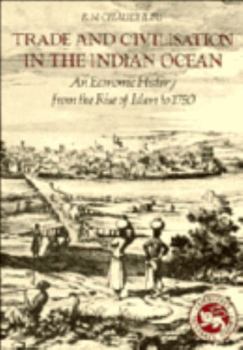Trade and Civilisation in the Indian Ocean: An Economic History from the Rise of Islam to 1750
Select Format
Select Condition 
Book Overview
Before the age of Industrial Revolution, the great Asian civilisations constituted areas not only of high culture but also of advanced economic development.
Format:Paperback
Language:English
ISBN:0521285429
ISBN13:9780521285421
Release Date:April 1985
Publisher:Cambridge University Press
Length:284 Pages
Weight:1.30 lbs.
Dimensions:0.6" x 6.8" x 9.6"
Customer Reviews
1 rating
True world history
Published by Thriftbooks.com User , 16 years ago
Chaudhury presents us with a readable examination of the economic history of the Indian Ocean system from the rise of Islam to 1750. He shows how the unification of the Middle East and North Africa under Islam and the unfication of China under the Tang dynasty helped bond the regions around the Indian Ocean (and into the Red and South China Seas) into an economically dynamic system. Empires, entrepots, tribes in Eurasia and Africa and traders from outside the Indian Ocean all played roles in the development of this system. Trade in the ocean was largely peaceful until the Portuguese entered the ocean with what Chaudhury identifies as a typically Mediterranean understanding of the sea and politics. The burgeoning Portuguese empire sought to control the oceanic spice trade by taking control of entrepots, attacking muslim vessels and regulating commerce. This process was viewed with fear by Genoa and Venice, who stood to lose their traditional roles in the spice trade, as well as by the traditionally neutral Indian trading ports. However, the sheer vastness of the ocean, the strength of the Ottoman state, the expansion of the Mughals in India, the naval efforts of the Aceh sultanate in Sumatra and the rise of the Protestant maritme powers of England the the Netherlands all contributed to the futility of the Portuguese venture. History is shown in a Braudellian schema. The importance of the land and ocean is not to understated in shaping the contours of history. It is truly international. The foundations of our modern world lie in this period when the old oceanic trade networks saw increased European presence, and indeed attempts at control by European powers, concomitant with the European conquest and colonization of the Americas. For the first time, what happened in the Andes and Mesoamerica mattered in China, India, Africa and Europe. For issues connected to Indian Ocean history, I'd also recommend Zheng He: China and the Oceans in the Early Ming Dynasty, 1405-1433 (Library of World Biography Series) (Library of World Biography) (Paperback) and Samurai William: The Englishman Who Opened Japan (Paperback). Also, reading The World of Late Antiquity AD 150-750: AD 150-750 (Library of World Civilization) (Paperback) may prove elucidating on the period leading up to this book.





